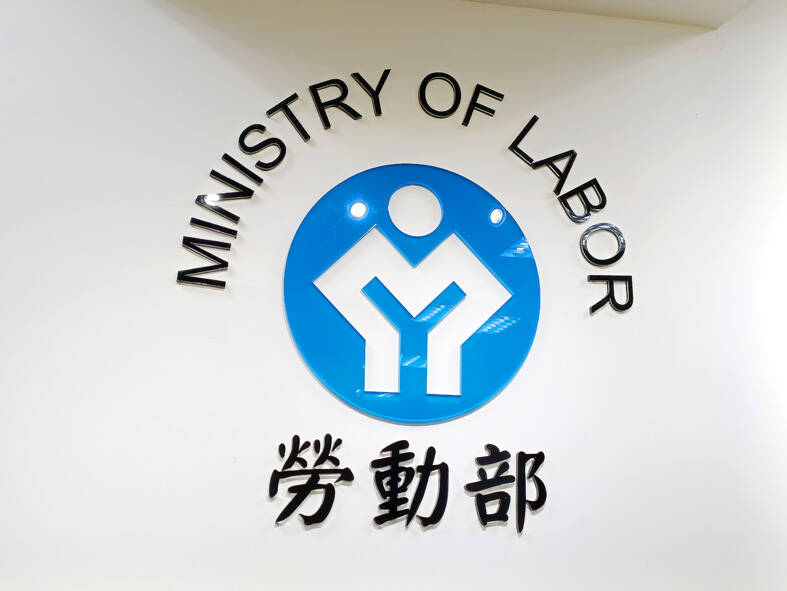Gender and age discrimination were the two most common forms of discrimination in the workplace in the past year, the Ministry of Labor said in a report yesterday.
Discrimination based on physical appearance and rank were the other most commonly cited factors, the report said.
The findings were the result of a survey conducted by the ministry to determine the effectiveness of the Gender Equality in Employment Act (性別平等工作法).

Photo: Lee Ching-hui, Taipei Times
In the 22 years since the act was promulgated, the percentage of businesses with more than 30 employees implementing sexual harassment prevention and reporting protocols has improved by more than 53 percentage points, from 35.5 percent to 88.8 percent, the ministry found.
From August 2023 to July last year, 3.6 percent of women and 0.8 percent of men reported that they had experienced sexual harassment in the workplace.
Women who faced harassment said it mostly came from colleagues or clients, with most reported harassment being “non-physical,” such as verbal abuse, unwanted photography, stalking and unwanted messaging.
Sexist remarks and physical contact were the next two most-reported forms of harassment.
The ministry also investigated gender-based unequal treatment in the workplace, finding that 2.8 percent of women received unequal wages compared with their male colleagues, and 1.9 percent reported receiving less-favorable work assignments.
Apart from gender, age discrimination was the most common form, with 3.6 percent of women and 4.5 percent of men reporting that it had happened to them.
For women, the next most-common forms of discrimination were class or rank within the company, physical appearance, and ideology or thinking, all ranging from 1.6 percent to 1.8 percent.
Men reported physical appearance, rank within the firm, and political affiliation as their next most-common form of harassment, ranging from 1.4 percent to 2.1 percent.
The survey collected 3,114 samples from public institutions and 6,901 from private employers, with 4,801 respondents identifying as women and 2,100 as men.

Weather conditions across Taiwan are expected to remain stable today, but cloudy to rainy skies are expected from tomorrow onward due to increasing moisture in the atmosphere, according to the Central Weather Administration (CWA). Daytime highs today are expected to hit 25-27°C in western Taiwan and 22-24°C in the eastern counties of Yilan, Hualien, and Taitung, data on the CWA website indicated. After sunset, temperatures could drop to 16-17°C in most parts of Taiwan. For tomorrow, precipitation is likely in northern Taiwan as a cloud system moves in from China. Daytime temperatures are expected to hover around 25°C, the CWA said. Starting Monday, areas

A Taiwanese software developer has created a generative artificial intelligence (AI) model to help people use AI without exposing sensitive data, project head Huang Chung-hsiao (黃崇校) said yesterday. Huang, a 55-year-old coder leading a US-based team, said that concerns over data privacy and security in popular generative AIs such as ChatGPT and DeepSeek motivated him to develop a personal AI assistant named “Mei.” One of the biggest security flaws with cloud-based algorithms is that users are required to hand over personal information to access the service, giving developers the opportunity to mine user data, he said. For this reason, many government agencies and

The National Fire Agency on Thursday said a series of drills simulating a magnitude 8.5 earthquake would be held in September to enhance the government’s emergency response capabilities. Since earthquakes cannot be predicted, only by continuously promoting disaster prevention measures could Taiwan enhance its resilience to earthquakes, agency Director-General Hsiao Huan-chang (蕭煥章) said in a news release. The exercises would be held to mark annual National Disaster Prevention Day on Sept. 21, the aim of which is to test Taiwan’s preparedness and improve its earthquake resilience in case of a major temblor, Hsiao said. As part of those drills, an earthquake alert would

DEFENSE: The National Security Bureau promised to expand communication and intelligence cooperation with global partners and enhance its strategic analytical skills China has not only increased military exercises and “gray zone” tactics against Taiwan this year, but also continues to recruit military personnel for espionage, the National Security Bureau (NSB) said yesterday in a report to the Legislative Yuan. The bureau submitted the report ahead of NSB Director-General Tsai Ming-yen’s (蔡明彥) appearance before the Foreign and National Defense Committee today. Last year, the Chinese People’s Liberation Army (PLA) conducted “Joint Sword-2024A and B” military exercises targeting Taiwan and carried out 40 combat readiness patrols, the bureau said. In addition, Chinese military aircraft entered Taiwan’s airspace 3,070 times last year, up about